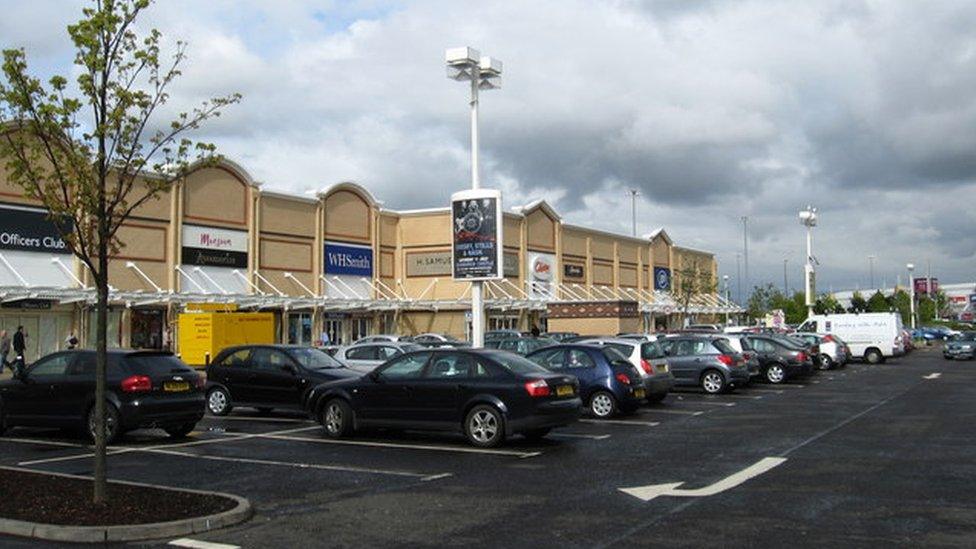Why does the Crown Estate own a retail park?
- Published

Fort Kinnaird was valued at £480m in 2007
Revenues from the Crown Estate are set to be devolved under the Scotland Bill which is currently going through the UK Parliament.
But an exception to the bill means the Fort Kinnaird retail park in Edinburgh, which the Crown Estate has a 50% stake in, will not be devolved.
The Scottish government has called for the retail park to be handed over to Holyrood along with the rest of the Crown Estate's assets in Scotland.
But the UK government has said it has no intention of doing so.
So what is the row about?
What is the Crown Estate?
The Crown Estate is owned by the Queen but managed by an independent board, known as the Crown Estate Commissioners.
It is an independent commercial property business which holds one of the UK's largest property portfolios as well as much of the UK's coastline, seabed and farmland.
The majority of the portfolio is made up of residential property, commercial offices, shops and business and retail parks, and includes almost all of Regent Street in London's West End.
The total value of The Crown Estate in Scotland was £261.5m in 2014/15, a £5.5m decrease from the previous year - which represents 2.6% of the UK total value of the Crown Estate.
It also has a 50% interest in an English Limited Partnership which owns Edinburgh's Fort Kinnaird retail park, as well as properties on Edinburgh's George Street.
Under the current funding arrangement, all profits from the estate are paid to the Treasury and 15% of this money is then given to the Queen, known as the Sovereign Grant - £37.9m in 2014 - which goes towards supporting her official duties.
Across the UK, the estate manages 16 retail parks and 3 shopping centres, including Fort Kinnaird retail park.
What is Fort Kinnaird?
Fort Kinnaird is a large outdoor retail park, south-east of Edinburgh, with more than 50 high street shops.
It generated £5.7m of profit for the Crown Estate in 2013-14.
Ownership of, and revenue from, the retail park is split equally between the Crown Estate and property trust the Hercules Unit Trust.
In 2007, Fort Kinnaird was estimated to be worth £480m by British Land, who manages the facility on behalf of the Crown Estate and the Hercules Unit Trust.
It has had more that 13 million visitors in the last year with an average spend of more than £118, according to British Land.
Why is Fort Kinnaird not included in the devolution of the Crown Estate?
The Scotland Bill states that the Treasury may transfer all the existing "Scottish functions" of the Crown Estate Commissioners to Scottish Ministers.
However, the bill excludes property, rights or interests held by a limited partnership.
This means that in Scotland, all of the Crown Estate's assets will be devolved to the Scottish government - with the exception of Fort Kinnaird, which is the only land in Scotland that the Crown holds in partnership.
David Mundell, the Scottish secretary, said that the shopping park would not be devolved "because of its legal ownership structure".
In a letter to the Scottish Parliament's Devolution (Further Powers) Committee, Mr Mundell said that a distinction under Scots law compared to the law in England and Wales on limited partnerships meant that the retail park could not be devolved to the Scottish government.
This means that the Crown Estate's share of the revenue for the shopping park would still be paid to the UK treasury.
What has the Scottish government said?
Rural Affairs Secretary Richard Lochhead has previously called the Crown Estate proposals in the Scotland Bill "needlessly complex", and accused UK ministers of trying to "exclude economic assets" from the Scottish government.
Speaking last month, he said: "We are focused on making the proposals simple and workable and to deliver a faithful and effective implementation of the Smith Commission's recommendations.
"Devolution of the management and income of the Crown Estate in Scotland presents a genuine opportunity to deliver benefits to communities across Scotland.
"It will also ensure we retain income in Scotland, introduce greater transparency and take advantage of our natural assets. I want to minimise disruption and provide certainty and I believe this Stakeholder Group will help give a voice to those who have an interest in this process."